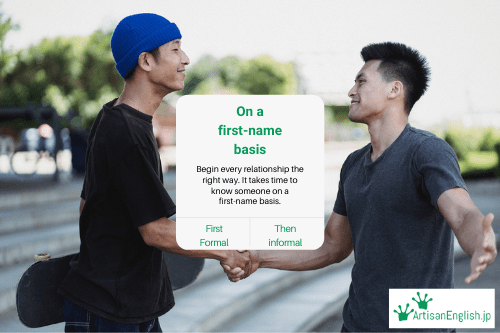
know formally until they invite you to be on a first-name basis.
(Photo: Allan Mas/Pexels | Text: David/ArtisanEnglish.jp)
YouTube / iTunes / Spotify / Radio Public / Pocket Casts / Google Podcasts / Breaker / Overcast
Listen to ArtisanEnglish.jp posts & lesson intros here.
Phrase: On a first-name basis
Some Japanese love to say that they are on a first-name basis with someone.
One of the main problems I’ve noticed is that they do not know how to do it properly.
For example, when I was in my late thirties, I began working in a high school in Japan.
All classes were conducted using the team-teaching system of three teachers – two Japanese and one native speaker – per lesson.
On my first day at the school, the Japanese teachers were introduced to me as Mr. Ishii, Ms. Ishihara, etc., and I was introduced to all the teachers as David.
See the difference in standard?
I was a teacher with a master’s degree in teaching English, 10 years of experience and thousands of hours at the chalkface.
Show people a little respect, please.
Using a person’s first name, especially in a formal situation, means that you are familiar with that person and have a good rapport with them.
In all of my teaching experiences in Japan, I have never been addressed formally unless I was teaching online.
Online students are extremely polite and courteous.
Whenever you meet someone for the first time, you should always address them as Mr. or Mrs. So-and-so.
If they want to be on a first-name basis with you, they will say something along the lines of, “Oh, please call me Matthew.”
Like or follow ArtisanEnglish.jp on social media.
That’s it. You are now on a first-name basis with that person, but they will now use your first name too.
My advice is in a professional situation, or when meeting an older person, you never use their first name until you are invited to do so.
It’s just plain rudeness.
Besides, never, never, never follow a double standard of addressing foreigners by their first name but Japanese by their family name.
If you want to come across as very polite, always address people you don’t know formally until they invite you to be on a first-name basis.
To put it in a historical context, you are not Nakasone, and they are not Regan.
Flesch-Kincaid Readability Test
This post is understandable by someone with at least a 7th-grade education (age 12).
On the Flesch-Kincaid reading-ease test, this post scores 71.
The easier a passage is to read, the higher the score on a scale of 0 – 100.

